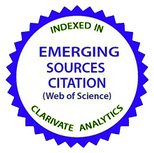Electrochemical Properties of Polyaniline in Aqueous Environments of Iodide and Bromide in the System of Electrochemical Energy Source
DOI:
https://doi.org/10.15330/pcss.17.2.234-240Keywords:
leucoemeraldine / emeraldine, specific capacity, , iodide and bromide redox-active electrolytesAbstract
The influence on specific discharge characteristics of redox - active iodide and bromide electrolytes of polyaniline as the cathode material in electrochemical energy sources with zinc anode was studied. Electrochemical and capacitive properties of PAN cathode was investigated using galvanostatic, potentiostatic, cyclic voltampermetric and impedance methods. It was established that PAN cathode inherent discharge specific capacity of Ср = 126 A × h × kg-1 with current load і = 103 A × kg-1 in zinc - sulfate electrolyte and Ср = 301 A × h × kg-1 in the same conditions in the presence of KI. Thus there is a reverse transition of various forms of PAN leucoemeraldine / emeraldine, that among the redox electrolyte causes increase in electrical capacitance and conductivity of PAN electrodes in the charged state.
References
[2] A.J. Heeger, Synth.Metals., 123, 23 (2002).
[3] A.M. Timonov, S.V. Vasil'eva, Sorosovskij obrazovatel'nyj zhurnal 6, 33 (2000).
[4] J.N. Gavgani, A. Hasani, Nouri, М. Mahyari, A. Saleh, Sensors and Actuators B: Chemical 229, 239 (2016).
[5] O.I. Aksiment'yeva, Fizyko-khimichni zakonomirnosti oderzhannya i vlastyvosti elektroprovidnykh polimeriv u tonkomu shari. Dys.dok. khim.nauk. L'vs'kyy natsional'nyy universytet imeni Ivana Franka, 347 (2000).
[6] A. Mac Diarmid, Curr. Appl Phys. 1, 269 (2001).
[7] N. Mashita, K. Miroguchi, K. Kume, A. Boyle, M. Lapkowski, C. Tsintaris, Synth.Met. 36, 139 (1990).
[8] B.E. Conway, J.Electrochem. Soc. 138, 1539 (1991).
[9] B.E. Conway, Electrochemical Supercapacitors, Kluwer Academic Publishers (Plenum Press, New York, 1999).
[10] C. Arbizanni, M. Mastragastino, R. Paraventi, Adv. Mater. 8, 331 (1996).
[11] R. De Surville, M. Josefowitz, L.T. Yu, J. Perichon, R. Buvet, Electrochim. Acta 13, 1451 (1968).
[12] P. Novak, K. Muller, K.S.V. Santhanam, O. Haas, Chem. Rev. 97, 207 (1997).
[13] Z. Mandic, M.K. Rokovic, T. Pokupcic, Electrochimica Acta 10, 2941 (2009).
[14] J. Desilvestro, W. Scheifele, O. Haas, J. Electrochem. Soc. 139, 2727 (1992).
[15] B.P. Bakhmatyuk, Electrochimica Acta, 163, 167 (2015).
[16] S.T. Senthilkumar, R.K. Selvan, M. Ulaganathan, J.S. Melo, Electrochimica Acta 115, 518 (2014).
[17] V.F. Lvovich, Impedance spectroscopy: applications to electrochemical and dielectric phenomena (Wiley: Hoboken, 2012).









